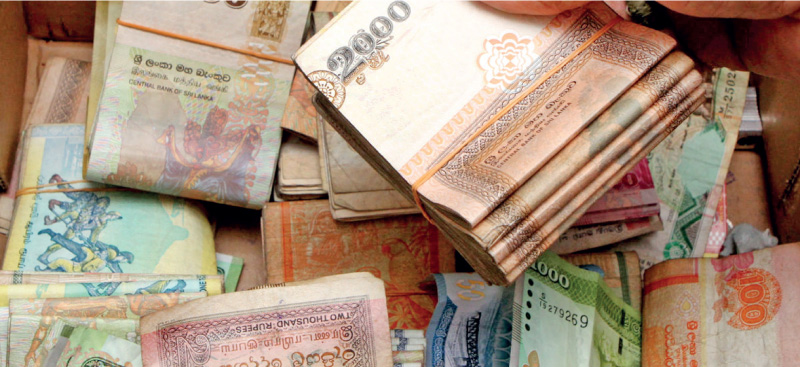Saturday Feb 14, 2026
Saturday Feb 14, 2026
Friday, 16 July 2021 00:05 - - {{hitsCtrl.values.hits}}

The rampant corruption and decline in the systems of public management associated with the plunder of public property operative within the political system itself have led to the collapse of the economy and intensification and escalation of the debt crisis
 There can be situations, where, like some humans and animals, even nations could go mad. Seemingly Sri Lanka today is in such a situation.
There can be situations, where, like some humans and animals, even nations could go mad. Seemingly Sri Lanka today is in such a situation.
Sri Lanka is currently going through the biggest and the most complex crisis it has ever faced since entering into the modern era. In terms of complexity and magnitude the present crisis can be described as a worse crisis, the impact of which is many times more than that of the challenges posed by Wijeweera and Prabhakaran put together.
Intellectual paucity
Despite the nature and extent of this crisis being complex and large, it still remains at a manageable level. But the way things are happening now is conducive to pushing the country towards a catastrophe rather than being able to manage the crisis successfully.
The Government does not have a proper analysis of its own on this crisis; nor does the Opposition. It seems that the Government is acting in an arbitrary manner, believing that it could manage the crisis alone and at its sole discretion. Opposition parties also seem to believe that the crisis will resolve by itself if they can gain power. The fact that not even a single concept paper analysing the causes of the crisis, and how it should be resolved has been published yet indicates the backwardness of the political and academic arena in Sri Lanka.
The nature of the crisis
The debt crisis of Sri Lanka is at its worst; yet, Sri Lanka’s main crisis cannot be considered as an issue that is limited to the debt crisis alone. The huge downturn of the economy is another significant feature of the crisis while the collapse of the political and social order also can be considered as two main features inherent in the Sri Lankan crisis. There is an interrelationship between these crises and they mutually affect each other.
Of these crises the ethnic, caste and religious tensions are paramount. The violent clashes occurred in consequence thereof caused not only a great loss of life and property, but also rendered the social psyche sick and distorted by the brutality unleashed on society by the rebels as well as the security forces. Sri Lanka now is left with a fragmented social order devoid of unity and integrity.
The reasons such as inappropriate management of governance, actions that are against the law and democracy and failure to put right the mistakes promptly, as and when they occur, have resulted in the decline and deterioration of the political system. The rampant corruption and decline in the systems of public management associated with the plunder of public property operative within the political system itself have led to the collapse of the economy and intensification and escalation of the debt crisis.
Overcoming the crisis
It is important that this crisis is overcome by understanding the causes of it in their proper perspective and launching a formal reforms program to solve them.
i. To take all necessary measures to build the Sri Lankan nation without delay
ii. Reform the system of governance to bring about a democratic rule based on the rule of law
1. The Head of State should be brought under the rule of law. For that, the judiciary should be vested with the powers to quash any action taken by the Head of State contrary to the law.
2. Explore the deterioration of the judiciary and make necessary reforms to establish a strong judiciary which would function independently, fairly and efficiently and in accordance with the law, and is vested with the power of judicial review.
3. Establish necessary reforms to orientate the media, media institutions and media personnel and journalists to act with a deep sense of social responsibility.
4. Make necessary reforms required for the control of the political party funds, election funds and election expenses.
5. Introduce reforms that will ensure the internal democracy of the political parties.
6. Make necessary reforms needed for investigating the expenses incurred for the maintenance of politicians, cut down unnecessary expenditure and bring the expenditure incurred to an acceptable level.
7. Establish reforms that will completely eliminate the ability of the Head of State or the people’s representatives making ill-gotten gains by misusing public property or transacting business with the government.
8. Establishment of a constitutional system that would not limit the right of the people to exercise their sovereign power only to vote in elections, but allow the public to actively and directly intervene in a democratic manner in instances where public intervention is essential for the security of the country and the benefit of the people in adopting a system of governance appropriate for Sri Lanka, regardless of the form and the structure of the system of governance chosen.
In doing so, the systems operative in some countries, such as ‘popular initiative’ and ‘alternate referendum’ in Switzerland can be taken into account. By that, (a) the public may be given the right to submit proposals to Parliament questioning the appropriateness of a course of action proposed or being implemented by the legislature or (b) criticising the persons holding high positions in government, with the stipulated number of signatures. Such a proposal must then be placed on the Order Paper of Parliament and put to vote after being debated.
9. The provisions that will not permit the removal or weakening of the democratic principles enshrined in the Constitution should be incorporated in the Constitution itself.
10. It is important that the changes proposed above should be made following the system of Participatory Constitution Making for two reasons; one is that the Participatory system is acknowledged as the 21st century model of Constitution Making, adoption of which is not confined only to Parliament; and the other is the state of degeneration of the Parliament of Sri Lanka,
Getting out of the debt trap
By June 2021, Sri Lanka’s external debt stood at $ 50.8 billion. Until 2025, $ 6 billion has to be allocated annually for disbursement of foreign loan instalments and interest. Sri Lanka is now in a situation where it is not possible to obtain loans at a low interest rate. Therefore, it should overcome the debt crisis through the International Monetary Fund (IMF).
Sri Lanka is a member of the International Monetary Fund. The purpose of the IMF is to provide credit facilities to member countries facing balance of payments problems. It is the only source to obtain loan facilities that it needs to overcome the current debt crisis at a lowest interest rate (0.050). Sri Lanka had previously faced balance of payments crises at the end of the JVP’s second insurrection (1989) and the end of the internal Civil War (2009). In both instances the International Monetary Fund provided credit facilities to overcome the situation.
The IMF does not provide facilities unconditionally, but it will not be possible for it to refuse the facility if Sri Lanka seeks its support with a sound program of action to overcome the precarious situation it has fallen into. The disputes that Sri Lanka has created with the international community, including the Human Rights Council can be described as an outcome of its stupidity and sense of arrogance. The damage caused to the country by this situation is immense. It is time now the leaders of the Government, with the support of the Opposition, should prevent the country from being plunged into catastrophe.